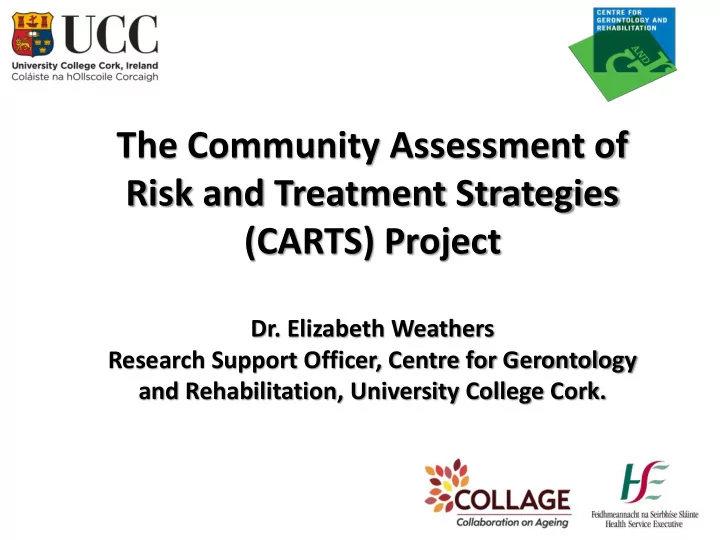

The Community Assessment of Risk and Treatment Strategies (CARTS) Project Dr. Elizabeth Weathers Research Support Officer, Centre for Gerontology and Rehabilitation, University College Cork.
Centre for Gerontology and Rehabilitation
Background • In Europe, the proportion of people aged >65yrs will grow to over 23% by 2030 (Boeckxstaens et al., 2011) • frail older people with multiple co- morbidities and complex needs living longer in the community • demand for limited healthcare services
Frailty • Difficult to define because it is multifaceted. • Frailty may be reversed when it is independent of disease and disability • “State of vulnerability defined by many factors” (Rockwood; Age & Ageing 2005). • Linked to increased risk of adverse healthcare outcomes (e.g. being hospitalised, transferred to a nursing home, or death)
Who is at risk? It is possible to identify What is the risk but how greatest risk? do we The Challenge quantify it? of Managing Frail Older Adults in the Community Should this What is the person stay at most home…..go to appropriate a nursing response? home?
A time of limited resources… • Who gets them? Risk/benefit analysis is basis for distribution of scarce resources… • Need to screen triage and prioritize those at greatest risk who will receive the greatest benefit… • How do we screen and treat to prevent frailty.. • Where do we start?
The CARTS Project Aim: To screen for frailty, triage those at medium-high risk of adverse healthcare outcomes and perform comprehensive assessments with person-centered treatment strategies.
Screening Tools • Short screening and assessment tools: – Risk Instrument for Screening in the Community (RISC) – Community Assessment of Risk Instrument (CARI) • These instruments assess a person’s physical, cognitive, and medical condition, and the ability of their caregiver network (i.e. family, friends, home help etc.) to manage any deficits in their care.
The RISC Tool • Assesses risk of adverse outcomes within a defined time period (i.e. one year). • Measures care needs (mental state, medical state and ADLs) & care deficits (ability of the caregiver network to manage any issues) • Quick, objective and reproducible • Predicts hospitalisation, institutionalisation and death – Triage those at higher risk to rapid assessment • Enhances the integrated care agenda – A common language between primary and secondary care
The CARI Tool • More detailed risk assessment • Collects demographic data and records the presence and magnitude (low, medium, high) of concern within and across three domains: – Mental state (7 items) – ADLs (15 items) – Medical state (9 items) • 10 minutes to complete as part of a comprehensive geriatric assessment
How CARTS Works Public Health Nurses assess and score older adults in the community using the RISC tool Those at medium-high risk are referred for further assessment using the CARI Tailored treatment strategies prescribed and delivered by primary care team
BENEFITS OF THE CARTS PROJECT 1. Early intervention to minimise, delay or prevent frailty 2. Proactive, integrated community-based approach 3. Prioritisation of limited resources 4. Enhanced decision-making processes in the community 5. Reduced incidence of adverse healthcare outcomes with associated cost savings 6. Improved quality of life
Work to Date • The CARTS instruments have been used with community- dwelling older adults in Portugal (n=5,500), Australia (n=500), Spain (n=350) and Ireland (n=800). • Results to date indicate that the RISC has good predictive validity (for hospitalisation, institutionalisation and death); high internal consistency and inter-rater reliability. • Unlike other risk/frailty instruments, the RISC takes into account the ability of the caregiver network to manage any concerns.
Publications to Date O’Caoimh et al. (2014) Screening for markers of frailty and perceived risk of adverse outcomes using the Risk Instrument for Screening in the Community (RISC). BMC Geriatrics 14: 104. Clarnette et al. (2014) The Community Assessment of Risk Instrument: Investigation of inter-rater reliability of an instrument measuring risk of adverse outcomes. Journal of Frailty and Aging (early online publication). O’Caoimh et al. (2015) Which part of a short, global risk assessment, the Risk Instrument for Screening in the Community (RISC), predicts adverse healthcare outcomes? Journal of Aging Research (in press). O’Caoimh et al. (2015) Risk prediction: a systematic review of personalised screening for adverse outcomes in community-dwelling older adults . Maturitas (accepted). Leahy-Warren et al. (2015) Components of the Risk Instrument for Screening in the Community (RISC) that predict Public Health Nurses' perception of risk. Journal of Frailty and Aging (in press). O’Caoimh et al. (2015) The Risk Instrument for Screening in the Community (RISC): A New Instrument for Predicting Risk of Adverse Outcomes in Community Dwelling Older Adults. BMC Geriatrics (in press). Leahy- Warren et al. (2015) Multidisciplinary Health Care Professionals’ experiences of using the Risk Instrument for Screening in the Community (RISC): A cross cultural perspective. Journal of Research in Nursing (under review). International Association of Gerontology and Geriatrics – European Region Congress (April 2015) National Homecare and Assisted Living Conference in Dun Laoghaire in May 2015 (invited speaker) ICT4Ageing Conference in Lisbon in May 2015 (Prof Molloy keynote speaker) GSA Conference in Orlando, USA in November 2015 (Symposium and abstracts submitted)
Funding • European H2020 – Applied for H2020 in 2014 – successful Stage 1, unsuccessful Stage 2 – Resubmit for H2020 2016/2017 calls – The RISC tool is currently being integrated into 5 H2020 proposals (3 for PHC-21 and 2 for PHC-25) • Other National/International – Health Research Board 2015 Definitive Intervention Call (submitted) – Funded in Spain, Portugal and Australia for their studies underway – Health Service Executive implementation across Cork and Kerry to screen 3000, triage and pilot interventions ( € 300,000 funding from 2015-2017).
Thank You ANY QUESTIONS??
Recommend
More recommend